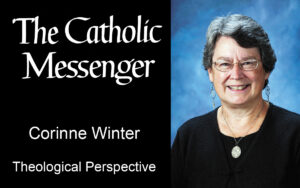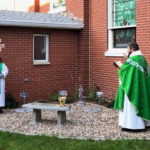Shortly after this paper is published, we will celebrate the feasts of All Saints (Nov. 1) and All Souls (Nov. 2). When I was young, these two feasts seemed to present a rather stark contrast. On All Saints, Day, we thought about all the especially holy people we heard about from the sisters and priests at school: Saints Francis and Clare, St. Ignatius, St. Agnes, St. Therese, and so many more. Some years members of one class would dress up as favorite saints and visit other classes to tell their stories. We were encouraged to ask for their intercession and to think about ways in which we could emulate the canonized saints and thus live holier lives so that we would share in the eternal reward they were already enjoying. It was a challenge, though. All the saints were from long ago and far away and the things they had done seemed so extraordinary, far beyond our humble reach.
 On Nov. 2, we turned our thoughts to the “poor souls in purgatory.” I remember bulletin boards featuring images of hands reaching heavenward from amid flames. We talked about “time in purgatory” as a kind of punishment during which people completed their atonement for sins of their earthly life. On this day, we brought to mind deceased relatives and friends, people whom we had actually known. We focused on praying for them with what bordered on a kind of desperation. Let them not still be suffering in purgatory or, if they were, let our prayers help them hurry on to heaven.
On Nov. 2, we turned our thoughts to the “poor souls in purgatory.” I remember bulletin boards featuring images of hands reaching heavenward from amid flames. We talked about “time in purgatory” as a kind of punishment during which people completed their atonement for sins of their earthly life. On this day, we brought to mind deceased relatives and friends, people whom we had actually known. We focused on praying for them with what bordered on a kind of desperation. Let them not still be suffering in purgatory or, if they were, let our prayers help them hurry on to heaven.
Since the Second Vatican Council, the church has called us to a richer theology of the communion of saints. We understand ourselves to have an intimate connection in the Holy Spirit with all who have gone before us struggling as we do to live as God calls us to live. While we absolutely continue to value the practice of praying for those who have died, we no longer picture them primarily as waiting and suffering for years in a place of punishment.
The Catholic Catechism instructs us to think of purgatory as a process by which those who have died prepare for the fullness of communion with God. We should set aside the notion of “time in purgatory,” as a sort of prison sentence assigned according to numbers and kinds of sins not fully repented. We no longer focus on “poor souls” but recognize that those undergoing the process of purification already rejoice in the knowledge that their eternal destiny is with God. They are among those whose intercession we seek when we pray, “All holy men and women, pray for us.”
Thus, All Saints Day and All Souls Day come together as celebrations of our union with all who are in Christ: those living and those who have died. As I contemplate the recent death of my father-in-law, and the fact that my mother’s death seems imminent, I find great encouragement in the idea of the communion of saints. It doesn’t take away the pain of loss, but it reminds me that we remain connected by much more than human memories; we are one in Christ.
Celebrating the communion of saints should, it seems to me, also remind us that we are already connected to all the living, all created by God, all called together to ultimate communion in and with God. With that insight, should my prayers of desperation focus on those suffering here and now? Those oppressed under unjust laws and systems? Further, should those prayers move me to seek ways of alleviating such suffering where I can? The Kingdom or Reign of God about which we hear more and more in the Gospel as the end of the liturgical year approaches is not an exclusive party to which some are invited because they deserve it or because they belong to the “in group.” It represents, rather, the ultimate goal of God’s creation. We are called not to seek the “golden ticket” for ourselves alone but to work tirelessly for the good of all creation, so that the divine goal may be reached.
(Corinne Winter is a professor-emerita of St. Ambrose University, Davenport.)











